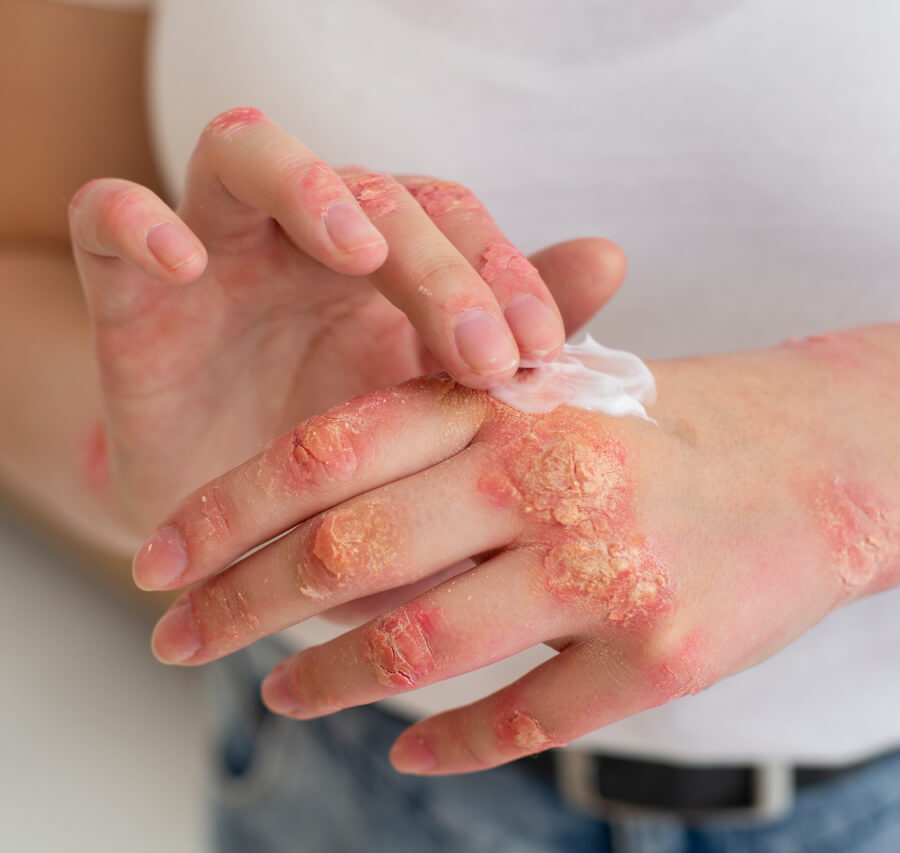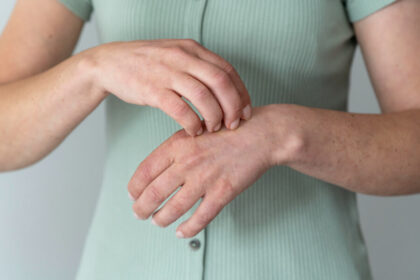Psoriasis is a chronic skin disease that impacts millions of individuals globally.
It causes patches of red, inflamed, and scaly skin that can be itchy, painful, and sometimes bleed.
It can also affect the nails, joints, and other parts of the body.
It is not contagious, but it can have a significant impact on your quality of life, self-esteem, and mental health.
Many people with it wonder how long their condition will last, and whether they can achieve remission or prevent flares.
In this blog post, we will answer some of the most common questions about it, such as:
- What causes psoriasis and what are the triggers?
- What are the different types and symptoms of psoriasis?
- How is psoriasis diagnosed and treated?
- How long does psoriasis last and can it go away?
- How can you prevent or reduce psoriasis flares?
- What causes psoriasis and what are the triggers?
It is an autoimmune disease, which means that your immune system mistakenly attacks your own healthy cells.
In psoriasis, the immune system targets the skin cells, causing them to grow faster than normal and pile up on the surface of the skin.
Causes
The exact cause of It is not fully understood, but it is believed to involve a combination of genetic and environmental factors.
Some people may inherit genes that make them more prone to developing It , while others may experience It after exposure to certain triggers.
Triggers are factors that can worsen or provoke It symptoms.
They vary from person to person, but some of the most common ones include:
- Infections, such as strep throat, colds, or skin infections
- Injuries, such as cuts, burns, or bug bites
- Stress, which can affect your immune system and hormones
- Medications, such as beta blockers, lithium, or antimalarials
- Alcohol, which can dehydrate your skin and interfere with your medications
- Smoking, which can damage your skin and increase inflammation
- Weather, such as cold, dry, or sunny conditions
- Diet, such as foods that are high in fat, sugar, or gluten
Not everyone with It will have the same triggers, and some people may not have any identifiable triggers at all.
It is important to keep track of your symptoms and potential triggers, so that you can avoid or manage them as much as possible.
What are the different types and symptoms of psoriasis?
It can affect different parts of the body and have different appearances, depending on the type of psoriasis.
There are five main types of psoriasis, each with its own characteristics and symptoms:
1. Plaque psoriasis
This is the most common type of it, affecting about 80-90% of people with the condition.
It causes red, raised, and scaly patches of skin, usually on the elbows, knees, scalp, and lower back.
The patches can be itchy, painful, and sometimes crack and bleed. They can also vary in size, shape, and color, depending on your skin tone.
2. Guttate psoriasis
This type of It mainly affects children and young adults, and is often triggered by a bacterial infection, such as strep throat.
It causes small, pink, or purple spots on the skin, usually on the trunk, arms, and legs.
The spots are not thick or raised like plaque psoriasis, and they may clear up on their own or become chronic.
3. Inverse psoriasis
This type of it affects the skin folds, such as the armpits, groin, buttocks, and breasts.
It causes smooth, red, and shiny patches of skin that can be irritated by friction and sweating. It can also be complicated by fungal or bacterial infections.
4. Pustular psoriasis
This is a rare and severe type of psoriasis, which causes pus-filled blisters on the skin.
It can occur in widespread patches or in localized areas, such as the palms or soles.
The blisters can be painful, feverish, and potentially life-threatening if not treated promptly.
5. Erythrodermic psoriasis
This is the most serious and rarest type of psoriasis, which affects the entire body.
It causes widespread redness, scaling, and peeling of the skin, along with severe itching, burning, and swelling.
It can also cause dehydration, infection, and organ failure. It’s a medical emergency that has to be attended to right away.
It can also affect the nails, causing them to become thick, pitted, discolored, or loose.
It can also affect the joints, causing a condition called psoriatic arthritis, which causes pain, stiffness, and swelling.
About 10-30% of people with psoriasis develop psoriatic arthritis.
How is psoriasis diagnosed and treated?
It is usually diagnosed by a dermatologist, who is a doctor that specializes in skin conditions.
The diagnosis is based on your medical history, physical examination, and sometimes a skin biopsy, which is a small sample of skin taken for testing.
There is no cure for psoriasis, but there are many treatments available to help you manage your symptoms and improve your quality of life.
The treatment options depend on the type, severity, and location of your psoriasis, as well as your personal preferences and overall health.
Some of the most common treatments for psoriasis include:
Topical treatments
These are creams, ointments, or lotions that you apply directly to your skin.
They can help reduce inflammation, itching, and scaling.
Some of the ingredients used in topical treatments include corticosteroids, vitamin D analogues, retinoids, coal tar, salicylic acid, and moisturizers.
Light therapy
This is a treatment that involves exposing your skin to ultraviolet (UV) rays, either from natural sunlight or artificial sources.
UV rays can help slow down the growth of skin cells and reduce inflammation.
However, they can also increase your risk of skin cancer and sunburn, so you need to use them with caution and under medical supervision.
Oral medications
These are pills that you take by mouth.
They can help suppress your immune system and reduce inflammation.
Some of the oral medications used for psoriasis include methotrexate, cyclosporine, acitretin, and apremilast.
Biologics
These are injections or infusions that you receive at a clinic or hospital.
They are made from living cells or proteins that target specific parts of your immune system that are involved in psoriasis.
Some of the biologics used for psoriasis include etanercept, infliximab, adalimumab, ustekinumab, secukinumab, and ixekizumab.
These treatments can have various side effects, such as infections, liver damage, kidney problems, or allergic reactions.
Therefore, you need to consult with your doctor before starting any treatment, and follow their instructions carefully.
You may also need to switch or combine treatments over time, depending on your response and tolerance.
How long does psoriasis last and can it go away?
Psoriasis is a chronic condition, which means that it lasts for a long time and can come and go.
The duration and frequency of it’s flares and remissions vary from person to person, and can be influenced by many factors, such as your triggers, treatments, lifestyle, and stress levels.
Some people may have mild or occasional symptoms, while others may have severe or persistent symptoms.
Some people may experience long periods of remission, which is when your symptoms are minimal or absent, while others may have frequent or constant flares, which is when your symptoms are worse or new.
Psoriasis can also change over time, in terms of the type, location, and severity of your symptoms.
For example, you may start with plaque psoriasis on your elbows and knees, and later develop guttate psoriasis on your trunk, or inverse psoriasis on your skin folds.
Psoriasis can also go into spontaneous remission, which is when your symptoms disappear without any treatment or apparent reason.
However, this is rare and unpredictable, and your symptoms may return at any time.
There is no way to predict how long your psoriasis will last, or whether it will go away completely.
However, with proper treatment and care, you can achieve better control of your symptoms and reduce the impact of psoriasis on your life.
How can you prevent or reduce psoriasis flares?
While you cannot prevent it from developing or cure it completely, you can take some steps to prevent or reduce psoriasis flares, such as:
Identify and avoid your triggers, such as infections, injuries, stress, alcohol, smoking, or certain foods
Follow your treatment plan as prescribed by your doctor, and report any side effects or changes in your symptoms.
Keep your skin moisturized and protected from the sun, wind, and cold
Maintain a healthy weight and a balanced diet, rich in fruits, vegetables, whole grains, lean protein, and healthy fats.
Exercise regularly and moderately, to improve your blood circulation, reduce inflammation, and relieve stress.
Manage your stress levels, by practicing relaxation techniques, such as meditation, yoga, breathing exercises, or hobbies.
Seek support from your family, friends, or a professional, such as a therapist, counselor, or a support group.
Conclusion
In conclusion, It is a chronic skin condition that involves unpredictable flares and periods of remission.
While there is no definitive answer to how long it lasts, understanding the factors that trigger flares and utilizing preventative measures can help individuals manage their symptoms and potentially extend periods of remission.
Remember, patience and persistence are key when it comes to navigating this complex condition.
By staying informed, seeking appropriate treatment, and adopting a healthy lifestyle, those with it can empower themselves to live fulfilling lives while minimizing the impact of this chronic condition.
Let us break down the barriers and misconceptions surrounding psoriasis, and together, create a more accepting and supportive environment for all those affected by this condition.
FAQs
How long does a typical psoriasis flare-up last?
The duration of a it flare-up varies from person to person. In general, flare-ups can last anywhere from a few weeks to several months.
Factors such as the type of psoriasis, severity, and individual response to treatment can influence the duration.
Is psoriasis a chronic condition, or can it go into remission?
It is considered a chronic condition, meaning there is no permanent cure.
However, it can go into remission, where symptoms significantly improve or even disappear for a period.
Remission duration varies, and some individuals may experience prolonged periods without symptoms.
Can lifestyle changes help prevent psoriasis flare-ups?
While It cannot be entirely prevented, certain lifestyle changes can help manage and reduce the frequency of flare-ups.
Maintaining a healthy diet, managing stress, avoiding triggers, and adopting a good skincare routine are strategies that may contribute to preventing flare-ups.
What factors contribute to the length of a psoriasis remission period?
The length of a remission period in it can be influenced by various factors, including the effectiveness of treatment, adherence to medications, lifestyle choices, and individual response to environmental triggers.
Regular follow-ups with a healthcare provider can help monitor and adjust treatment plans for optimal results.
Are there specific triggers that can prolong or worsen psoriasis symptoms?
It’s triggers vary among individuals but may include stress, infections, certain medications, and changes in weather.
Identifying and managing these triggers can play a crucial role in preventing prolonged or worsening symptoms.
Keeping a diary to track potential triggers may assist in understanding individual patterns.
Can psoriasis be managed without medications, relying solely on lifestyle changes?
Lifestyle changes can complement it’s management, but for many individuals, medications prescribed by a healthcare professional are essential.
Lifestyle modifications, including a healthy diet, regular exercise, and stress management, can contribute to overall well-being and may help improve symptoms, but they are typically not a standalone solution for moderate to severe cases.
It’s crucial to work closely with a healthcare provider to determine the most effective treatment plan for each individual.





